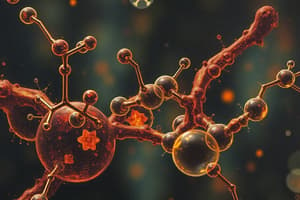Podcast
Questions and Answers
What is the term for the energy that must be overcome to reach the transition state in a reaction?
What is the term for the energy that must be overcome to reach the transition state in a reaction?
- Spontaneous energy
- Metastable energy
- Activation energy (correct)
- Catalytic energy
Which model describes the interaction between an enzyme and its substrate where the active site undergoes a conformational change to accommodate the substrate?
Which model describes the interaction between an enzyme and its substrate where the active site undergoes a conformational change to accommodate the substrate?
- Induced Fit Model (correct)
- Substrate Flexibility Model
- Transition State Model
- Lock-and-Key Model
What is the term for enzymes that have the same catalytic activity but different amino acid sequences?
What is the term for enzymes that have the same catalytic activity but different amino acid sequences?
- Isomers
- Isocatalysts
- Isoenzymes (correct)
- Isotopes
At what point does an enzyme exhibit the maximum catalytic activity in terms of pH?
At what point does an enzyme exhibit the maximum catalytic activity in terms of pH?
What is the term for the reactant in an enzyme-catalyzed reaction?
What is the term for the reactant in an enzyme-catalyzed reaction?
Which type of reaction can occur without the input of external energy?
Which type of reaction can occur without the input of external energy?
What is the term for the temporary high-energy state during a chemical reaction?
What is the term for the temporary high-energy state during a chemical reaction?
What is the term for the region of the enzyme where the substrate binds and the catalytic reaction occurs?
What is the term for the region of the enzyme where the substrate binds and the catalytic reaction occurs?
What type of molecules can increase the rate of a chemical reaction without being consumed in the process?
What type of molecules can increase the rate of a chemical reaction without being consumed in the process?
At what point does an enzyme exhibit the maximum catalytic activity in terms of temperature?
At what point does an enzyme exhibit the maximum catalytic activity in terms of temperature?
What is the term for the process of breaking down a large molecule into smaller units using an enzyme?
What is the term for the process of breaking down a large molecule into smaller units using an enzyme?
Flashcards
Activation energy
Activation energy
The minimum energy required for a reaction to occur.
Induced Fit Model
Induced Fit Model
Enzyme's active site changes shape to accommodate the substrate.
Isoenzymes
Isoenzymes
Enzymes with same function, different structure (amino acid sequences).
Optimum pH
Optimum pH
Signup and view all the flashcards
Substrate
Substrate
Signup and view all the flashcards
Spontaneous reaction
Spontaneous reaction
Signup and view all the flashcards
Transition state
Transition state
Signup and view all the flashcards
Active site
Active site
Signup and view all the flashcards
Catalysts
Catalysts
Signup and view all the flashcards
Optimum temperature
Optimum temperature
Signup and view all the flashcards
Hydrolysis
Hydrolysis
Signup and view all the flashcards
Enzyme
Enzyme
Signup and view all the flashcards
Reaction rate
Reaction rate
Signup and view all the flashcards
Catalyst function
Catalyst function
Signup and view all the flashcards
Enzyme-substrate complex
Enzyme-substrate complex
Signup and view all the flashcards
Biochemical reactions
Biochemical reactions
Signup and view all the flashcards
Protein
Protein
Signup and view all the flashcards
Study Notes
Enzyme Catalysis
- The energy that must be overcome to reach the transition state in a reaction is known as the activation energy.
Enzyme-Substrate Interaction
- The induced fit model describes the interaction between an enzyme and its substrate, where the active site undergoes a conformational change to accommodate the substrate.
Enzyme Variations
- Enzymes with the same catalytic activity but different amino acid sequences are known as isoenzymes.
Enzyme Optimum Conditions
- An enzyme exhibits maximum catalytic activity at the optimal pH.
- An enzyme exhibits maximum catalytic activity at the optimal temperature.
Chemical Reactions
- The reactant in an enzyme-catalyzed reaction is known as the substrate.
- Spontaneous reactions can occur without the input of external energy.
- The temporary high-energy state during a chemical reaction is known as the transition state.
Enzyme Structure and Function
- The region of the enzyme where the substrate binds and the catalytic reaction occurs is known as the active site.
- Molecules that increase the rate of a chemical reaction without being consumed in the process are known as catalysts.
Enzymatic Processes
- The process of breaking down a large molecule into smaller units using an enzyme is known as hydrolysis.
Studying That Suits You
Use AI to generate personalized quizzes and flashcards to suit your learning preferences.




